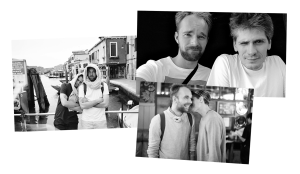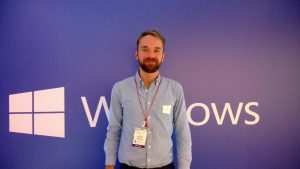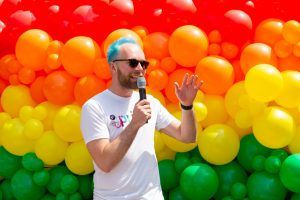As a child growing up in post-Soviet Russia, Aleksey Fedorov had two abiding passions—technology and creating more equal societies. He channeled the intersection of those areas to energize Pride at Microsoft.
COPY LINK TO PAGE
In June 2015, Aleksey Fedorov joined a sea of people in Seattle for his first Pride parade and was astounded by the scene before him.
There were children and parents, firefighters and elected officials, colleagues from Microsoft, citizens and representatives of businesses and civic institutions, the government, openly celebrating people being who they are and loving who they love. This would be unimaginable in Russia, where Aleksey (who uses both he and they pronouns) had grown up and left just months earlier with his boyfriend because they no longer felt safe in their country.
Overcome with emotion, his partner at his side, Aleksey cried. He felt joy, but also the years of shame he’d carried as a closeted young gay man in Russia. He felt shy and exposed. He wasn’t yet fully out and was still grappling with his identity. Amid that confusing swirl of feelings, Aleksey, his mind in perpetual motion, was struck by another thought.

He was heartened at seeing Microsoft employees marching in their matching Pride-themed T-shirts and appreciated the volunteer-led effort. But this is Microsoft, they thought. We can do more. We can reach more people and have an even bigger impact.
Those musings planted the seed for Aleksey, now Microsoft’s director of brand activation, to lead a transformation in how one of the world’s biggest tech companies supports the global Pride campaign and, along the way, navigate their own personal evolution.
*****
Aleksey was born in Saint Petersburg in the late 1980s, the only child of a computer programmer father and a mother who worked in publishing and later finance. Like many Russian families at the time, his parents didn’t have much money. One of Aleksey’s vivid childhood memories was of his parents buying one Snickers bar a month and cutting it into small slices to be savored. Economic hardship was common then and living with his parents and grandparents in a three-room apartment didn’t seem unusual.
Coming of age in a post-Soviet world when a democratic future seemed within reach, at least for a while, Aleksey was animated by the notion of creating more equal societies and saw technology as a potent tool to do that. His passion was personal— though Russia decriminalized gay relationships in 1993, antigay sentiment was deeply ingrained, and Aleksey learned early to keep their orientation to themselves. He came out only when he was in college and just to a few close friends, and he didn’t tell his parents he was gay until a few years ago.
“I didn’t feel comfortable sharing, because it was considered shameful and bad,” Aleksey says.
I didn’t feel comfortable sharing, because it was considered shameful and bad.
A bright student fascinated by political movements, Aleksey studied international relations at Saint Petersburg State University with the goal of applying his education to effect change. But he became disillusioned with the nonprofit sector and started seeing the business world as a more powerful force for impacting society. He headed off to business school and discovered a passion for marketing and branding, disciplines he believed could help make a difference in people’s lives by conveying the good work businesses were doing.
Aleksey was part of a student team that won a Microsoft business competition, and soon after completing a master’s degree in international business in 2011 he was offered a job at Microsoft’s Moscow office. The position, which would be the first of 11 at Microsoft in as many years, involved generating fans and brand love for Windows. Aleksey helped create Windows collaborations with large companies including Disney and Starbucks and drove marketing for Windows apps in Russia.
“Microsoft was kind of a merger of passions for me—for technology and for doing something amazing for the public good with technology,” Aleksey says. “I was always drawn to Microsoft because I feel like the company is fundamentally standing up for the right things.”
Life was going well. Aleksey’s career was flourishing, and he was dating a man, Nikolay, who would later become their husband. They met during the 2011 protests around Russia’s elections and some of their first dates were on the streets of Moscow at demonstrations. When Russia invaded and subsequently annexed Crimea in 2014, they took to the streets again.
But that year, the Russian government passed a law criminalizing protests, and one day Nikolay was arrested and fined. If that happened again, Aleksey knew Nikolay could face a criminal sentence and possible prison time. Staying in Russia was becoming too dangerous. So, Aleksey decided to apply for a job at Microsoft in the United States.
“I really loved my work at Microsoft in Russia, but I wanted to have more impact on the strategy and work—not just in the go-to-market aspect, but the idea behind what we’re doing and why we’re doing it,” he says. “And so these two forces, there was a confluence of them.”
Aleksey was offered a marketing position with Windows Store at Microsoft’s headquarters in Redmond, Washington, and moved with Nikolay, a visual artist, to Seattle in 2015. A few weeks later, the couple went to Seattle’s Pride parade. It turned out to be a pivotal moment for Aleksey personally and professionally.

At the time, Aleksey says, they didn’t perceive Pride as being very visible at Microsoft’s headquarters. The company had long supported LGBTQIA+ rights and was sponsoring Pride efforts in cities around the world, but Aleksey believed Microsoft had an opportunity to be even more vocal about its values. He envisioned a campaign that would use Microsoft’s platform to amplify LGBTQIA+ voices and create a movement that could engage with customers, with the goal of driving societal change.
Aleksey was elected as Microsoft’s worldwide Pride campaign co-chair in 2017, helping lead a team of more than 200 volunteers working on events in 60 cities around the world. The following year, the team interviewed LGBTQIA+ employees across the company and featured their stories on a new website and on social media.
In 2019, the 50th anniversary of the Stonewall uprising, Microsoft Pride took a significant step forward. Aleksey worked with Microsoft’s industrial design team to develop a Pride Surface type cover and skin, as well as Windows wallpapers and other Pride-related products, to promote inclusion for the LGBTQIA+ community.
As Aleksey saw it, “We have these tremendous products which have millions of customer touch points every single day, and that’s the best channel we have. If we release something for Pride—for Surface or for Office or for Xbox—we will reach millions of people.
“We know that proximity drives empathy,” they say, “and when people are exposed to these messages, they’re more likely to change their minds or act in support of the community.”
That year, Aleksey—who by then had moved from head of brand strategy for Microsoft Store to head of executive communications for Microsoft Gaming—received a company award for their work in promoting diversity and inclusion efforts and revamping brand and design guidelines for Microsoft Store.
Accepting the award, Aleksey was quick to credit their community. “This is about all of us, because every day we make choices (about) who we include and who we do not include,” they said, addressing the audience at the awards ceremony. “This is for all of us making the change in this company and beyond.
Still, Aleksey has been instrumental in driving the vision around Microsoft’s Pride campaign and determining how to build upon it year after year, says Eileen Mikloiche, one of three global Pride co-chairs, along with Aleksey and iAsia Brown in 2022. Since 2021, Aleksey has been the worldwide membership cochair for GLEAM, Microsoft’s employee resource group for the LGBTQIA+ community, one of nine such groups that reflect Microsoft’s diverse employee base. His work with GLEAM, combined with his position in Microsoft branding, gives him a unique perspective on both the internal and external aspects of Microsoft’s Pride campaign, Eileen says.
Aleksey has a clear vision of what he wants to achieve, she says, and doesn’t take no for an answer when he’s passionate about something, which is often.
“You just feel his passion because it’s authentic. It comes from his heart,” she says. “He inspires people to want to be part of something bigger and to see what they can contribute to bring it to life. When you encounter someone like that, the passion is contagious. The excitement is contagious.”
He inspires people to want to be part of something bigger and to see what they can contribute to bring it to life.
Aleksey has a wry sense of humor that often makes her laugh, Eileen says, and is also deeply compassionate. One day, soon after the Uvalde school massacre, she was having a hard time and broke down on a work call. Aleksey encouraged her to take some time to herself, then reached out the next day to see how she was doing.
“He didn’t need to do that,” Eileen says. “Many people may not have remembered, but he did.”
Eli Friedman, a 20-year Microsoft veteran, began mentoring Aleksey not long after he moved to Seattle and has stayed in touch with him through his various roles. He describes Aleksey as a self-directed “hand-raiser” who is eager to learn and unafraid to put himself in unfamiliar or even uncomfortable situations, someone who leads through collaboration and exudes positive energy.
“He’s full of life, and he’s full of light,” says Eli, Microsoft’s general manager of integrated marketing, Modern Life, Search & Devices . “No matter what kind of day you or I are having, Aleksey really lifts people up, which is an awesome trait. It comes from a super genuine and authentic place, which I think people see very quickly in him.”
Describing Aleksey as “one of my favorite people at Microsoft,” Eli says he learns something new every time they talk.
****
The theme for Microsoft’s 2022 Pride campaign is “Pride has no borders,” an acknowledgement of the shared challenges faced by people worldwide. The campaign includes stories from Microsoft employees in various countries, a virtual reality event, and the release of a Pride-themed Xbox controller that features 34 LGBTQIA+ flags and is customizable through Xbox Design Lab.
This year’s theme has particular resonance for Aleksey, who has family and friends in Russia and in Ukraine. In the first week after Russia invaded Ukraine in late February, their grandmother was sitting in front of her television in Russia when her heart stopped. Aleksey still hasn’t been able to process her death, since much of his time and energy these days is spent looking for ways to help people in Ukraine. He has a rule for himself—he must do something every day, whether it’s making a donation, writing to a politician, or checking on a friend.
“Every waking hour I’m thinking about folks in Ukraine—how we can help, what we can do,” he said during a recent interview for an internal Microsoft radio show. “That’s what’s been driving me.”
The fight for equality, infused into Aleksey’s consciousness since childhood, has defined their life and career. For them, Pride is not just about gender or sexuality. It’s about people everywhere who are fighting discrimination of any kind. It’s about creating a world in which everyone is welcome.
And as Aleksey has helped evolve Pride at Microsoft, so too has Pride changed him. The work has made them more comfortable in their own skin, freer to express gender in a way that feels authentic to them. It has connected him with Microsoft employees around the world who share his values, and with people who tell him Pride makes them feel less alone. Those comments mean everything to him.

Aleksey sees Microsoft Pride, with its elected leadership model, as a democratic effort. Its strength, they say, is in the diversity of people whose perspectives will continue defining and evolving the movement going forward.
“It’s not about me,” Aleksey says. “It’s about me finding a way to help other people feel a sense of ownership and accountability. It’s everyone driving it, so it goes on and it moves. It’s really about lifting others’ voices.”

